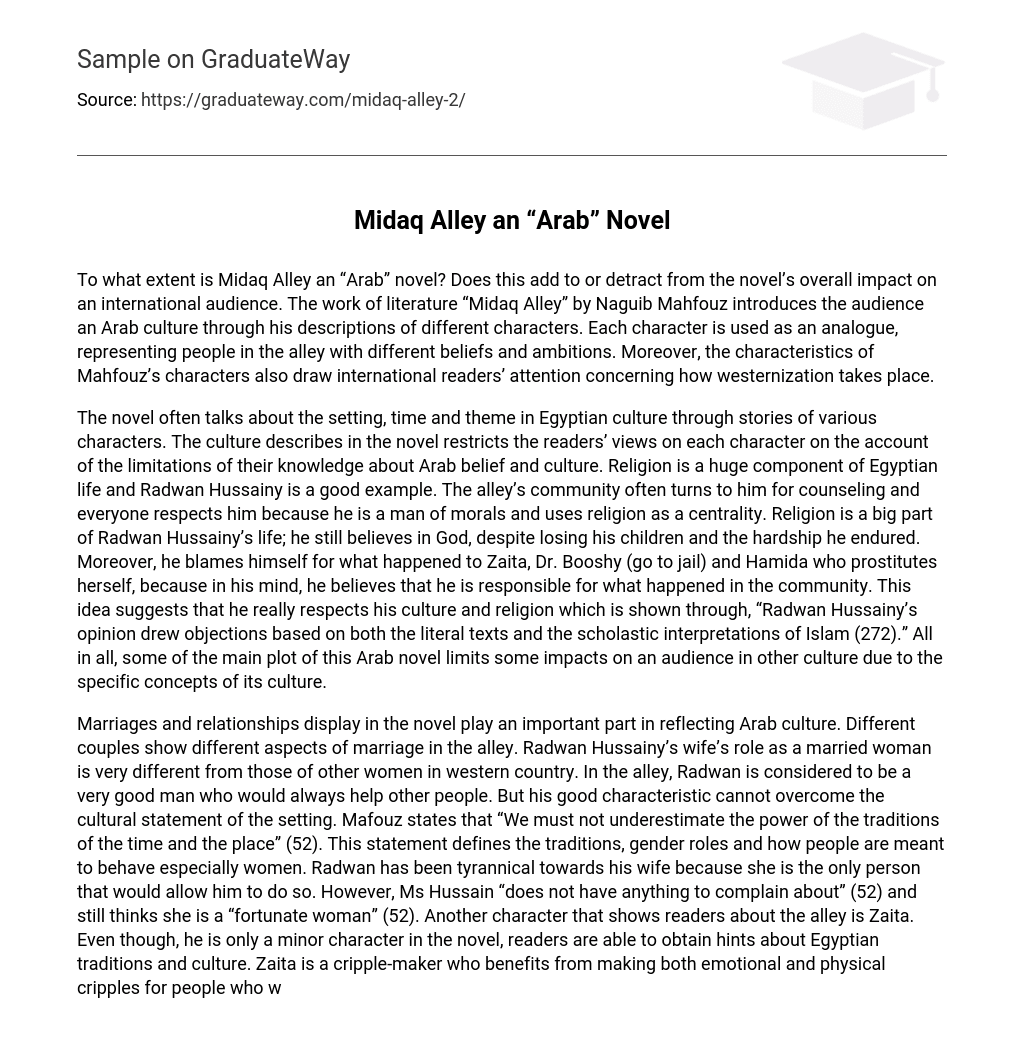The question of whether “Midaq Alley” qualifies as an “Arab” novel and how this affects its impact on a global audience is worth examining. Naguib Mahfouz’s literary work delves into Arab culture by portraying a range of characters inhabiting the alley, each individual serving as a metaphor for varied beliefs and ambitions. Furthermore, Mahfouz’s characters also pique the interest of international readers, prompting contemplation on the process of westernization.
The novel delves into various characters’ stories to shed light on the setting, time, and theme of Egyptian culture. The portrayal of this culture in the book can limit readers’ understanding of each character, as their knowledge of Arab beliefs and culture is limited. Religion plays a significant role in Egyptian life, exemplified by Radwan Hussainy. He is highly respected in the alley community, as he is known for his moral values and uses religion as a guiding force. Despite the hardships he has faced, including the loss of his children, Radwan Hussainy remains a devout believer in God. He holds himself accountable for the misfortunes that befall Zaita, Dr. Booshy (who ends up in jail), and Hamida (who turns to prostitution). In his mind, he believes that he bears responsibility for these events within the community. This demonstrates his deep respect for his culture and religion, as depicted when his opinion on certain matters is met with objections based on literal Islamic texts and scholastic interpretations (272). Overall, the specific cultural concepts portrayed in this Arab novel may limit its impact on audiences from other cultures.
The role of marriages and relationships in reflecting Arab culture is significant in the novel. The alley showcases different couples, each exemplifying different aspects of marriage. Radwan Hussainy’s wife’s role as a married woman differs greatly from the role of women in Western countries. In the alley, Radwan is praised for his helpful nature, yet his positive qualities are overshadowed by the cultural expectations of the setting. Mafouz emphasizes the importance of traditions and gender roles, particularly for women, stating, “We must not underestimate the power of the traditions of the time and the place” (52). Radwan displays tyrannical behavior towards his wife because she is the only person who allows him to do so. Despite this, Mrs. Hussain does not voice any complaints and considers herself fortunate. Another character, Zaita, provides readers with insight into Egyptian traditions and culture. Although a minor character, Zaita’s occupation as a cripple-maker reveals that in Arab culture, individuals can become beggars without negative repercussions from society.The text highlights the presence of a specific concept, exemplified by Kirsha, the cafe owner, who has a predilection for young boys. This issue is prevalent due to cultural norms in the context of Muslim society, where women typically only venture outside accompanied by their father, brother, or husband. Consequently, a significant extent of homosexuality is observed among men.
Mahfouz’s novel, “Midaq Alley”, delves beyond the alley and its culture, showcasing a broader range of themes. The impact of westernization is significant, captivating international readers. For instance, a film adaptation of Mahfouz’s novel explores the Mexican people’s experience with western influences and their reactions to various situations, mirroring the plot of “Midaq Alley”. Within the novel, characters fall into two categories: those content with life in Midaq Alley and others driven to seek better opportunities elsewhere, each holding contrasting views on what constitutes ‘better’. Hamida exemplifies the yearning for change, feeling that she deserves more than residing in the antiquated alley. In her eyes, Midaq Alley is nothing more than a “Nothing Alley” (27), prompting her to question why she remains there. During World War II, many individuals from Midaq Alley seek work with the soldiers in hopes of financial gain and a more comfortable existence. Hamida willingly sacrifices everything she has in pursuit of the affluent life she has always dreamed of. Non-religious and with a distinct perspective from her alley neighbors, Hamida envisions a superior existence in the modern world.In the end, the protagonist chooses to become a prostitute in order to obtain fancy clothing and jewelry. She has no regrets about this decision, as it satisfies her desire for excitement and adventure (186). On the other hand, the older generations are resistant to the new culture that is replacing their own. They are set in their ways and do not have the desire to leave behind their homes or seek new experiences. Lastly, Abbas represents a different perspective. He is unwilling to leave the alley behind and remains content with his current life. He joins the army solely to make his fiancé, Hamida, happy by earning more money. Abbas maintains that “Our alley is wonderful. I have no desire for anything more than to peacefully live here” (252). However, in the end, Abbass falls victim to the British soldiers and westernization. In conclusion, Mafouz discusses three different outcomes resulting from westernization: those who can adapt and forget their old ways will experience positive outcomes, while those who cling to their traditions will suffer negative consequences.
Although there are some aspects of the novel that diminish its impact on an international audience, the main storyline serves to highlight the effects of westernization on other cultures and settings. For example, the reciter has spent twenty years at a café, which is now the only place where he can derive any benefit. However, due to westernization taking hold in the alley, he loses his job because people prefer new technology and development. This is evidenced by the statement “people today don’t want a poet. They keep asking me for a radio (6).” Mafouz’s intention is to convey that westernization will not provide an immediate solution to poverty and the longing for a better life.
Despite Mafouz’s portrayal of a specific time period and culture in “Midaq alley”, the concept of westernization resonates with an international audience. Mafouz effectively communicates the potential impact of change on a country, particularly in situations where cultural values hold great significance.





